#books on writing
Text
Always keep in mind our tendency to avoid conflict (we’re writers) and to cheat and use dialogue to further plot (a cardinal sin). So to do the first and avoid the second, use evasive dialogue or miscommunication to always increase the tension. Avoid volleys of dialogue that resolve tension too quickly.
- Chuck Palahniuk, Consider This: Moments in My Writing Life After Which Everything Was Different
#quote#chuck palahniuk#consider this#books on writing#writeblr#writing#writing resources#writing advice#writing tips#writing quotes
14 notes
·
View notes
Text
Have crossed the 30k threshold on this BG3 fic now. I thought 30k would be my max, but I have at least four more chapters in mind. 😭
I’ve been doing some research on how to write better descriptions. I’m not a very visual person (I have very little mental visualization a la “picture an apple in your mind”). Finding out people can see the equivalent of entire movies in their heads is wild to me. Sounds fake (I am intensely jealous).
Picked up Description: A Busy Writer’s Guide by Marcy Kennedy and it’s been a godsend. Love how she gives direct steps on how to improve and what to look for in terms of what’s not as effective vs more effective. Also love how she gives concrete guidelines about how much time to devote to describing things.
Description for me is often something I’m like “oh god they’ve been talking too much we need something else in there”. I want to be more intentional with it and paint clearer pictures, I just have struggled to know what constitutes as “good” vs “bad” description and how to identify it in my own writing.
Planning to try to utilize her suggestions while editing. I know it’s something I’m learning, so I hope it doesn’t come out too clunky. 😭 It’ll get easier and more natural with time, I just have to trust the process and be patient.
She talks a lot about developing your voice too (your own and your characters’), which I think is really cool. I feel like I hear people talk about voice a lot but so rarely have I seen someone dig deeper into how to enhance it.
Highly recommend this book. Definitely going to try out some of her other ones too.
#book recommendations#writing#description#Marcy Kennedy#busy writer’s guides#writing tips#books on writing
2 notes
·
View notes
Text
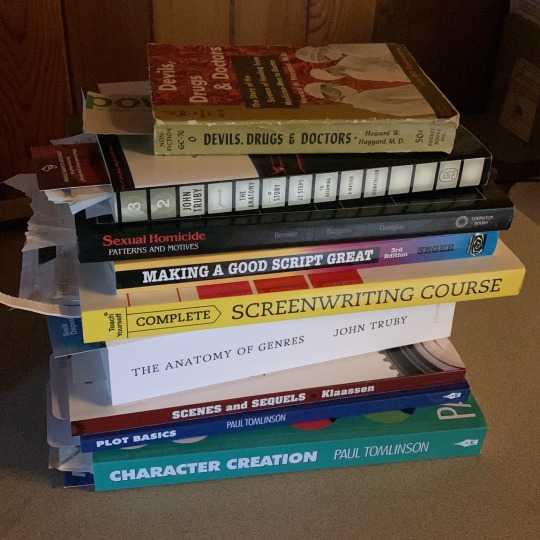
A stack of books I’ve been reading, mostly about the craft of writing 🤘🖤
4 notes
·
View notes
Text
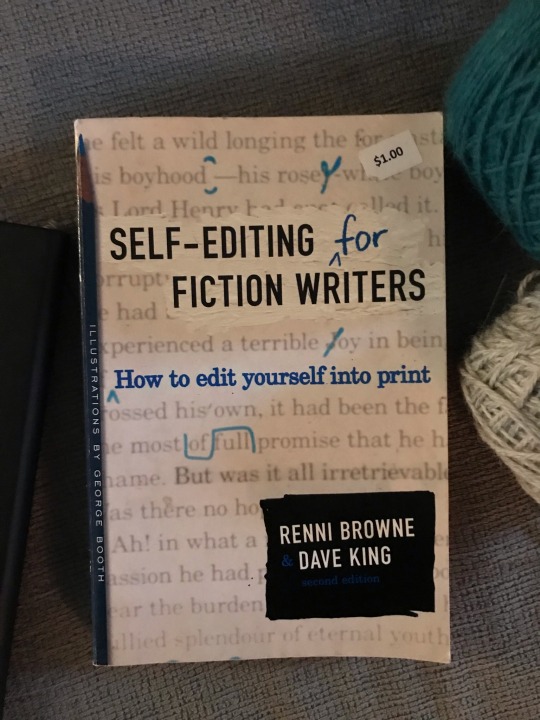
This book should have been titled All the Things You’ve Done Wrong Forever
My writing is gonna be better for it but damn I feel called out every other page.
Highly recommend.
21 notes
·
View notes
Photo
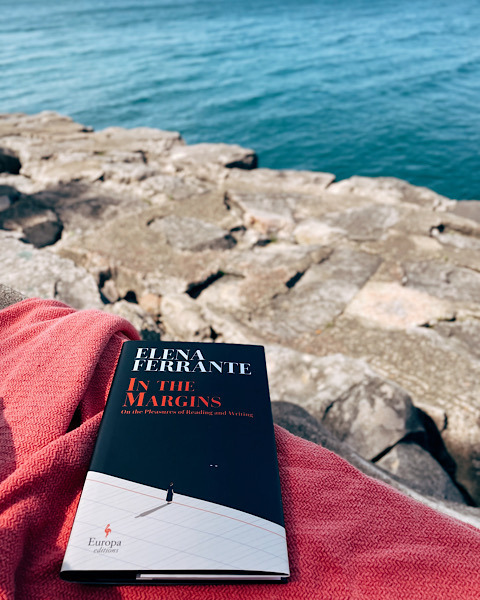
It's honestly infuriating how well Elena Ferrante writes. She writes unlike anyone else I've read. In this book, In the Margins: On the Pleasures of Reading and Writing, translated by Ann Goldstein, she describes in four lectures her inspirations and how they've shaped the way she thinks about the act of writing.
It isn't always easy to break apart her often philosophical arguments, but it's worth it. At the center of her argument is a division: between 'true writing,' that spark that flows naturally from our pen and that we have little control over, and the writing we learn how to do, from practice, from reading, from influences, from craft. The best we can do, most of the time, is try and capture the fleeting thoughts in our brain and transfer them (always too slowly) to the page, and hope that 'true writing' leaks out with your craft, and that your craft is good enough to translate it for your reader. These intersections and tangles were a huge part of the inspiration behind Lila and Elena in the Neapolitan Novels, and their strange dynamic, and she breaks down much of what helped her form their fraught relationship, and how writing ties into it closely.
She argues that one of the best ways to get to truth is to take the standard forms and tropes of genre, and then subvert or "deform" them. The truth is can't be expressed properly through what we think of as realism, because what is real is too different for each "I", each viewpoint—the best way to get at the truth is to embrace that, and learn to "use with freedom the cage we're shut up in"—use what we have, the genres, the limitations of language, all of it, and burst through it, be creative with it. In other words, use conventions to destroy them.
As you can see just from my review, her viewpoints aren't simple, but they're fascinating and thought-provoking, and like everything Ferrante writes, they had my full attention. I will definitely be thinking about this one for a long time, and I'm glad to add it to my shelf on craft.
#elena ferrante#ann goldstein#in the margins#the neapolitan novels#books on writing#writers on writing#my book reviews
26 notes
·
View notes
Text

You ever think that maybe you're going a little too hard on your pre-story research?
15 notes
·
View notes
Text
Translating Myself and Others by Jhumpa Lahiri
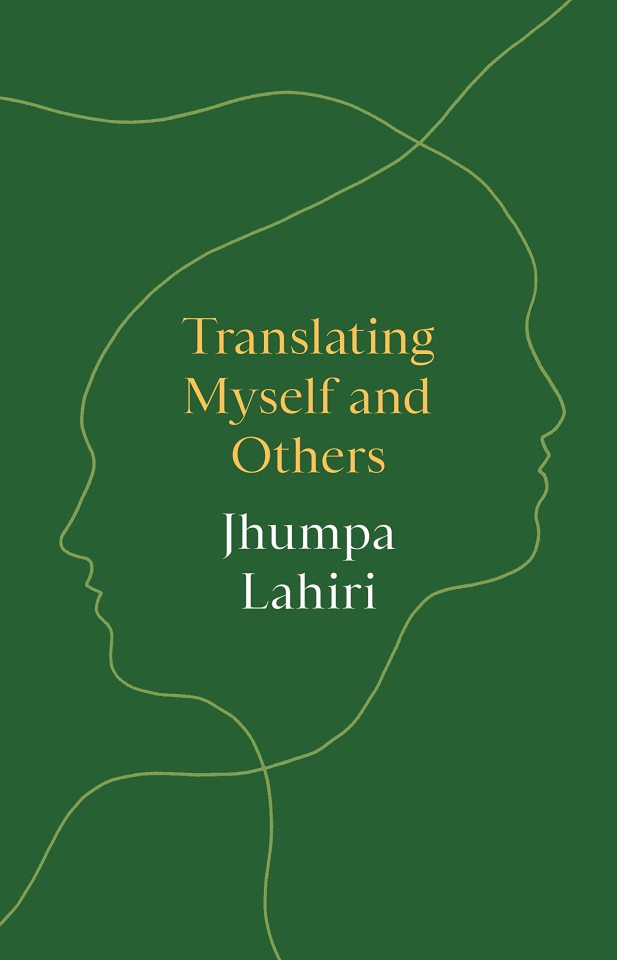
“WRITING IN ANOTHER LANGUAGE REACTIVATES THE GRIEF OF BEING BETWEEN TWO WORLDS, OF BEING ON THE OUTSIDE. OF FEELING ALONE AND EXCLUDED.”
While I can’t quite satisfyingly articulate or express why I find such comfort in Jhumpa Lahiri’s writing, I can certainly make a stab at it. In many ways, Translating Myself and Others reads like a companion piece to In Other Words, as Lahiri once again reflects on her relationship to languages, in particular, English and Italian, and the precarious act of literary translation. These essays are profoundly insightful, eloquently written, and erudite without being inaccessible. Lahiri’s illuminating meditations on writing and translating draw from her own personal experiences and from those of others, as many of the essays included in this collection expand on the works, ideas, and experiences of other authors and historical figures, many of whom Italian. Lahiri’s interrogation of their work, which hones in on their multilingualism and their own efforts with translation and self-translation, added an intratextual dimension to her essays, one that enriched her overall analysis. In many of these essays, Lahiri focuses in particular on her relationship to the Italian language: from the way people have questioned her choice to study this language and the validity of her written Italian, to the feelings brought about by writing in and speaking Italian.
In her speculations and contemplations on languages (who do they belong to? and if they do, to whom and why?), writing & translation Lahiri often refers to Ovid’s Metamorphoses, in particular the myth of Echo and Narcissus. In examining the acts of translation and self-translation Lahiri utilizes many apt metaphors, viewing translating as a ‘door’, a form of ‘blindness’ (this one is a bit unahappy comparison to make), a ‘graft’, a ‘traversing’, an act of negotiation and metamorphoses. I also appreciated her contemplations on the function played by writers and translators, the differences and similarities between these two roles and the way their work is perceived or not.
Translating Myself and Others presents its readers with a panoply of thoughtful and thought-provoking essays. Lahiri’s writing struck me for its clarity and gracefulness and I look forward to revisiting the essays here collected in the future.
my rating: ★ ★ ★ ★ ☆
❀ blog ❀ thestorygraph ❀ letterboxd ❀ tumblr ❀ ko-fi ❀ goodreads
#jhumpa lahiri#language#translation#books about books#books on writing#writing about writing#essays#italian#linguistics#indian american author#booklr#book reviews#wishfullydreaming#2022 release#read in 2022#book review
3 notes
·
View notes
Text
it's always so fascinating and heartbreaking when a character in a story is simultaneously idolized and abused. a chosen prophet destined for martyrdom. a child prodigy forced to grow up too fast. a powerful warrior raised as nothing but a weapon. there's just something so uniquely messed up about singing someone's praises whilst destroying them.
#writing#writing prompt#tropes#reading#books#book tropes#angst prompt#angst#booklr#writeblr#writers on tumblr#percy jackson#the poppy war#mythology#chosen one#atla#avatar#avatar the last airbender#bungou stray dogs#yosano akiko#anime#manga#my hero academia#todoroki shoto#neon genesis evangelion#the hunger games#10k#20k#30k#50k
100K notes
·
View notes
Text
kicking a hornets nest.
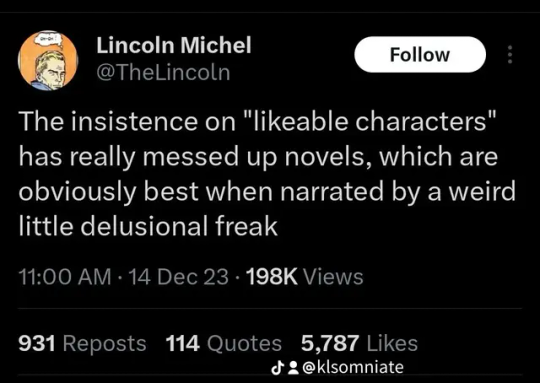
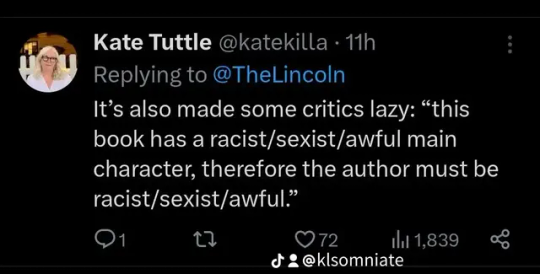
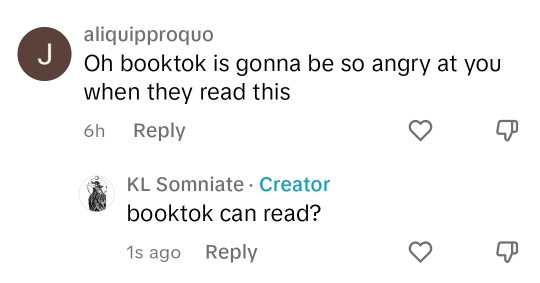
86K notes
·
View notes
Text
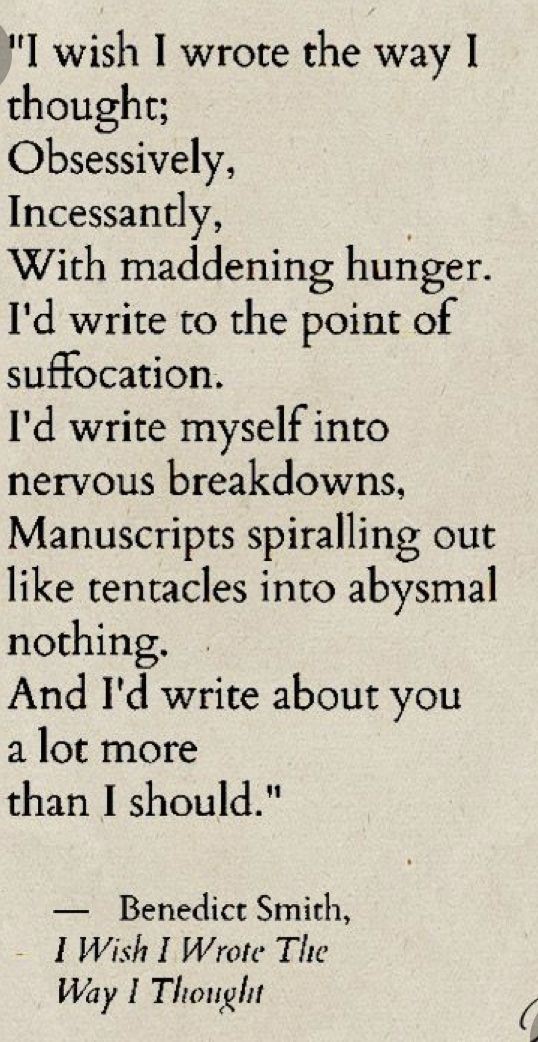
#aesthetic#dark academia#coffee#art#books#academia#college#studyblr#light academia#literature#benedict smith#Poetry#Writing#Writersblr
67K notes
·
View notes
Text
If a plot point is worth including, it’s worth depicting in a scene. Don’t deliver it in dialogue. You’re not Shakespeare limited to the stage at the Globe Theatre and the endurance of the groundlings’ legs. You have the budget and the time.
- Chuck Palahniuk, Consider This: Moments in My Writing Life After Which Everything Was Different
#quote#chuck palahniuk#consider this#books on writing#writeblr#writing#writing resources#writing advice#writing quotes#writing tips
8 notes
·
View notes
Text
Random writing thought: the best stories are often the ones that only you could have written — but also the ones that you could only write at this one moment.
I couldn't write All the Birds in the Sky from scratch now if I tried. But the me of 2013 couldn't have written The Prodigal Mother either.
#writing#am writing#am revising#fantasy#am writing fantasy#book tumblr#bookworm#bookworld#science fiction#books
34K notes
·
View notes
Text
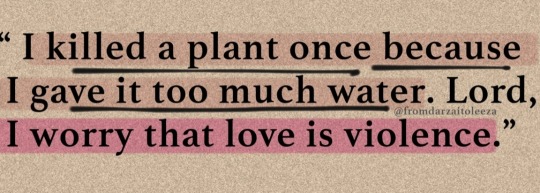

{Words by José Olivarez from Citizen Illegal /@fatimaamerbilal , from even flesh eaters don't want me.}
#web weaving#love#quotes#literature#words#dark acadamia aesthetic#dark acadamia quotes#classic literature#poem#poetry#prose#spilled thoughts#spilled ink#writing#light academia#lit#english literature#book quotes#quote#academia#typography#aesthetic#books#bookworm#books and libraries#literature quotes#dark academia#chaotic academia#poems on tumblr#dead poets society
52K notes
·
View notes
Text
Funniest thing I’ve seen on tiktok are those sigma male boys getting mad that American psycho was written by a gay man and going “well I like fight club better” buddy I’ve got some world ending devastating news for you
#I don’t like fight club#but other people do#gay people on their way to write some of the most relevant popular influencial literature of the 90s#solius posting#this shit also kills me because both of those books have. OVERT homosexual themes and moments
60K notes
·
View notes
Text
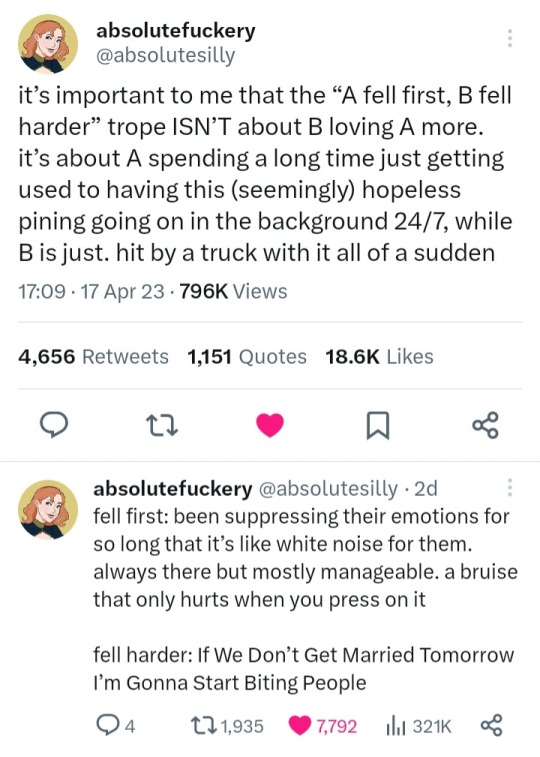
!!!!!!!
96K notes
·
View notes
Text
those first couple weeks after escaping a time loop have gotta be disorienting as all fuck. all those little cues that used to tell you what's about to happen are now triggers that cause you to brace for something that isn't coming. you have to relearn the permanence of death -- hell, you have reacquaint yourself with the entire concept of finality altogether. everything keeps changing but it never changes back and you keep having to remind yourself that this is normal. "it won't reset anymore," you echo to yourself, over and over and over, like a broken record, like you're still trapped in a loop, like someone who escaped the time loop but was doomed to bring it into the future with them
#orcspeak#edit: this is not about fanfic nor is it about a specific fanfic nor is it about a specific show or movie or book#this post is about the time loop trope itself which occurs in many different stories spanning many different art forms#i don't read or write fanfic and I'm not looking for fanfic recs and whatever character you think this is about there's#an 80 percent chance i don't recognize their name
48K notes
·
View notes